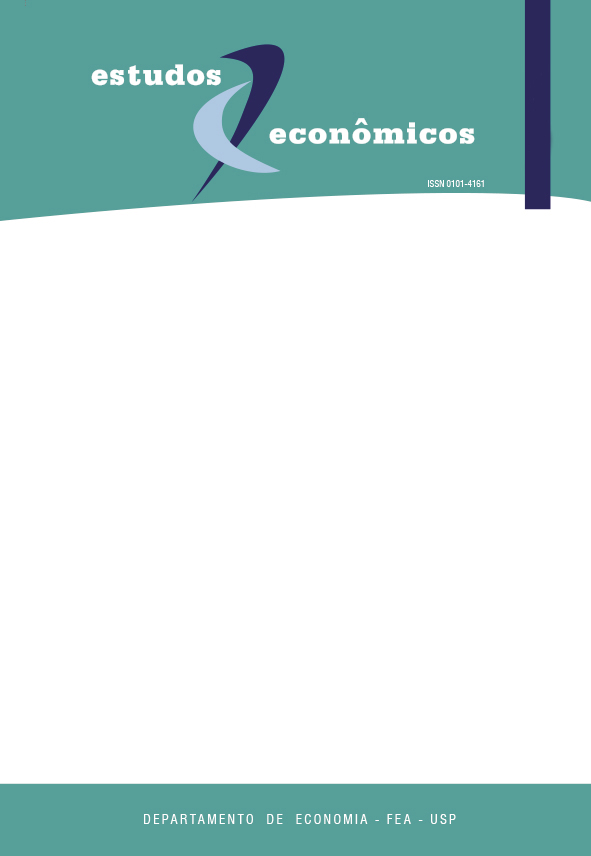The components of economic freedom, income and growth: an empirical analysis
DOI:
https://doi.org/10.1590/S0101-41612007000300003Keywords:
economic freedom, growth, Granger, causalityAbstract
This paper seeks to bring a better understanding of the relationship between economic growth and the disaggregated factors which constitute the elements of economic freedom. The two main objectives of this paper are to: (1) based on the Solow augmented growth model, test which of the elements of economic freedom demonstrate a statistically significant relationship to economic growth; and (2) establish which way the main causality direction between economic freedom and growth runs from. Finally, we identify desirable directions for further research and policy implications.Downloads
References
Ayal, Eliezer B.; Karras Georgios. Components of economic freedom and growth:
an empirical study. Journal of Developing Areas 32, p. 327-38, Spring 1998.
Berggren, N. Economic freedom and equality: friends or foes? Public Choice, v. 100, n. 3/4, p. 203–23, 1999.
Easton, Stephen T; Walker, Michael A. Income, growth, and economic freedom. American Economic Review, American Economic Association, v. 87, n. 2, p. 328-32, May 1997.
Esposto, A.; Zaleski, P. Economic freedom and the quality of life. Constitutional Political Economy, 10, p. 185-197, 1999.
Farr, W.; Lord, R.; Wolfewnbarger, J. Economic freedom, political freedom, and economic
well-being: a causality analysis. The Cato Journal, v. 18, n. 2, Fall 1998.
Friedman, Milton. Economic freedom, human freedom, political freedom. Speech delivered
at The Smith Center for Private Enterprise Studies, Hayward: California State
University, 1991.
Gwartney, James; Lawson, Robert. Economic freedom of the world: 2004 annual report.
Vancouver: The Fraser Institute, 2004. Data retrieved from www.freetheworld.com.
Gwartney, James; Lawson, Robert; Holcombe, Randall. Economic freedom and
the environment for economic growth. Journal of Institutional and Theoretical Economics, v. 155, n. 4, p. 1-21, 1999.
Haan, Jakob de; Siermann, Clemens L. J. Further evidence on the relationship between
economic freedom and economic growth. Public Choice, v. 95, n. 3-4, p.363-80, June 1998.
Heston, Alan; Summers, Robert; Aten, Bettina. Penn World Table Version 6.1. Center
for International Comparisons at the University of Pennsylvania (CICUP), October 2002.
Mankiw, N. Gregory; Romer, David; Weil, David N. A contribution to the empirics
of economic growth. NBER Working papers series n. 3541, 1992.
Norton, Seth W. Poverty, property rights, and human well-being: a cross-national
study. Cato Journal, v. 18, n. 2, p. 233-45, Fall 1998.
Smith, Adam. [1776] An inquiry into the nature and causes of the wealth of nations.
University Of Chicago Press, 1977. Reprinted.
Solow, Robert M. A contribution to the theory of economic growth. Quarterly Journal
of Economics, p. 65-94, February 1956.
Wu, Wenbo; Davis, Otto A. Economic freedom and political freedom. Forthcoming
in Encyclopedia of Public Choice, 2005.
Wu, Wenbo; Davis, Otto A.The two freedoms, economic growth and development: an empirical study. Public Choice, v. 100, n. 1/2, p. 39–64, July 1999.
Downloads
Published
Issue
Section
License
Copyright (c) 2007 Raphael B. Corbi

This work is licensed under a Creative Commons Attribution-NonCommercial 4.0 International License.
By submitting an article, the author authorizes its publication and attests that it has not been submitted to any other journal. The original article is considered final. Articles selected for publication are proofread for grammatical and orthographic errors. The journal does not pay rights for published articles. The Institute of Economic Research from the School of Economics, Business and Accounting of the University of São Paulo (Instituto de Pesquisas Econômicas da Faculdade de Economia, Administração e Contabilidade da Universidade de São Paulo) owns the journal's copyright.




